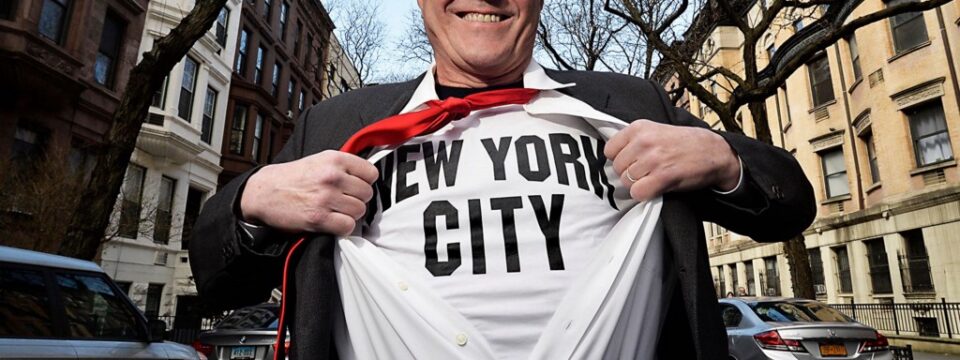NYC Mayoral Candidate Curtis Sliwa On His Relationship With New York’s Jewish Community, The Inspiration Behind The Guardian Angels, And His Vision For Making NYC A Safer Place For All
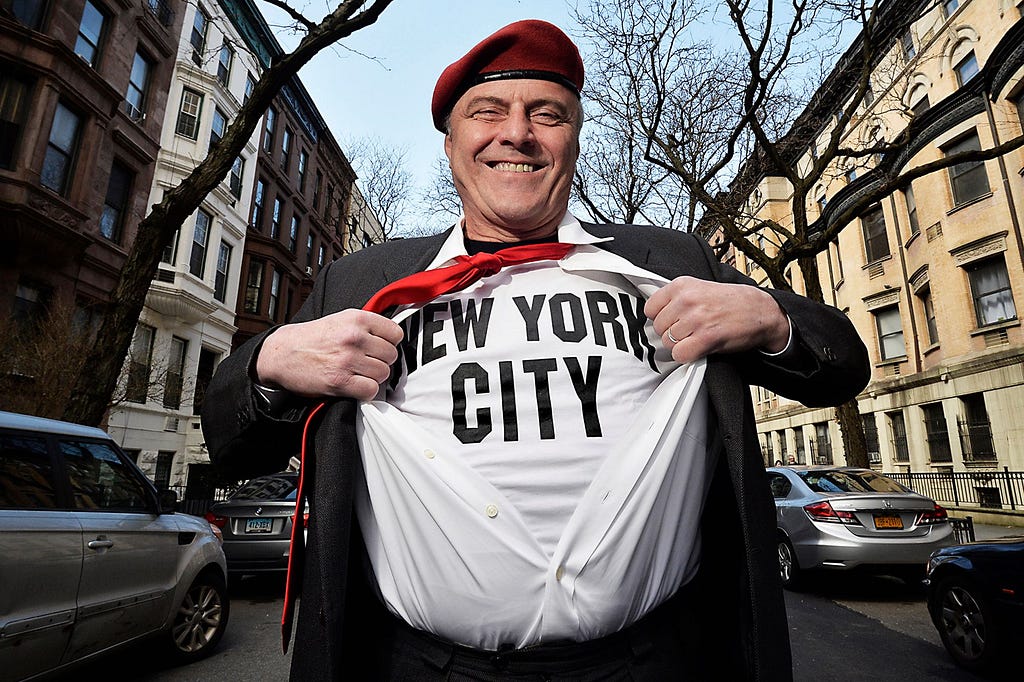
…Well, number one, if you don’t make safe streets, safe subways, or safe parks, you’ll never resurrect the city. Who’s going to want to come? Who’s going to want to take the risk? Who’s going to want to stay? And second, if you keep driving people away who pay the taxes, who’s going to pay for all the social services needed and the education and the budget?
I had the pleasure to interview radio host, Guardian Angel’s founder, and NYC Mayoral candidate Curtis Sliwa.
In the late 1970s, New York City was the modern-day equivalent of the Wild West. Murder and violent crime were the norms. A trip on the Subway was an exercise in urban survival. Residents of the city resigned themselves to the reality as the politicians and police seemed powerless.
However, a young man from Brooklyn, a former Jesuit student, felt someone had to do something. Curtis Sliwa stepped forward. He knew that the city he was born in, the city he loved, deserved better. Curtis Sliwa acted.
What started as a group of him and a dozen other dedicated volunteers riding the subways of New York to serve as protectors of everyday, law-abiding citizens grew into the “Guardian Angels” that residents of the Big Apple have come to know and love. With their distinctive Red Berets, they are as New York as Central Park or a potato knish. They operate under the motto “we dare to care” and have proved it repeatedly through the years, in some cases with their lives.
These days, the Guardian Angels have chapters in thirteen countries and over one hundred cities. While the original hometown group of thirteen has grown to thousands across the globe, the mission has not changed: to make a positive change in the community by involving members of our communities to step forward and take an active role. While the classic street patrols are the organization’s lifeblood, we all know that reaching the youth in our neighborhoods, especially those most at risk, is crucial. Once again, the Guardian Angels are meeting the need.
The “Junior Angels” program, their youth outreach programs, and their Washington Heights Community Center help kids with everything from homework to nutrition while getting them involved in their community. What Sliwa believed back in the beginning and till this day is that when people take an active role in their community, it makes things better for all of us.
Sliwa is a mayoral candidate for NYC 2022.
It’s a delight to speak with you, Curtis. Before we dig in, our readers would love to learn a bit about your background, how you grew up, and eventually what inspired you to join politics. I know you have a very colorful and fantastic story. Could you tell us how you grew up, your childhood backstory, and eventually, how you started the Guardian Angels?
Sure. I grew up in Canarsie in Brooklyn in a blue-collar, working-class family. My father Chester was a Polish Roman Catholic and a merchant seaman for 55 years. He and my mother, an Italian American, Roman Catholic got together right before World War II. I have two sisters, and I’m the son. So I’m right in the middle. I have an older sister and a younger sister.
We were brought up to believe that if you do good things, good things will come back to you. You don’t ask when, where, or how. Your mission in life is to do good things, and we were brought up to do selfless service.
I was brought up in a strong European Roman Catholic belief system, that poverty brings you closer to God. My father would take me around to the Bowery at that time in the 1960s. This is where the missions and the flophouses were, mostly for men who had serious alcohol problems or emotional disorders. He would constantly say to me: “Never laugh at these people and never make fun of them. They’re here by the grace of God. This could happen to you, me, or anyone else. Always remember that, son.” Those were messages that stuck with me at a very, very young age.
I started off going to parochial school, St. Matthews, a Catholic school in Crown Heights where I was taught by the Josephite nuns, and then in the fourth grade, I was transferred to PS 114 in Canarsie. My introduction to the Jewish community came about in junior high school, Bildersee Junior High School in Canarsie. On day one of registration, my mother Francesca took me in. My father was away at sea, and I said to her: “Mom, how come on the Arista the academic awards that are on all the walls, it’s all Jewish kids? What? They have some kind of connection with the Jewish teachers here?” And she said to me: “Child! quiet, quiet! Why don’t you follow some of the Jewish kids and see what they do after school, like Lee Rosen and Ira Breskin? You’re in their class instead of hanging out with your supreme “cougine” cousins, Lenny “Beans” Bianchino, Joey G., the Cheech from Howard Beach. Because you’re only going to get into trouble if you keep hanging out with your cousins. Why don’t you see what the Jewish kids are doing?”
So I took her up on that. After school, I followed Lee Rosen and Ira Breskin, and they took me over to the library in Canarsie, which was on Rockaway Parkway, and it was there that I was introduced to the blue-haired matron who ran the library. They introduced me to the internet of the time in the 1960s, which was microfilm, and boy, it was like I died and went to heaven. I got to read all these old newspapers, magazines, and periodicals that went back through the decades.
Increasingly my cousins would say: “Hey Curtis, you haven’t been around much lately. How come you’re not hanging out with us?” And, I’d have to come up with all kinds of excuses. So I tell them, “oh, I have a fever in my foot. It’s very contagious Lenny and Joey, and I don’t want to expose you to a fever in the foot.” And they would say: “A fever in the foot?” And I would say: “Yea you know, my father is a merchant seaman. It could be from some foreign country.” And they would say: “Well, don’t come by us!” My marks improved. I had an opportunity to see the value of education instead of just gliding through, which is what I was doing before.
Eventually, I went on to Brooklyn Prep, which was a Jesuit high school in Crown Heights again on Nostrand, President (Street), and Carroll, which is now Medgar Evers, a city university. Brooklyn prep is now closed. I would take the B17 bus right to Eastern Parkway and Utica Avenue, and as I’d be walking along Eastern Parkway- all the way over to Nostrand -that’s when I first was exposed to the first citizen patrol I ever saw, the Maccabees. The Lubavitchers were under attack then. Gangs were coming into their community. They were stealing their hats, stealing whatever they could get their hands on, knocking people over, very anti-Semitic.
There was this rabbi from Sao Paulo who had organized the men to respond to the term “Chapsum”. So if anyone was under distress, whether they were Jew or Gentile, one call of “Chapsum!” and all the men would drop whatever they were doing, run out into the streets, and pursue the assailants. I actually saw that one time. It was a group called the Tomahawks, a vicious street gang, and they were nothing but trouble. There were about six of them and they were starting all kinds of trouble. I remember a guy got out of his car and screamed “Chapsum!” and at that point, there had to be a hundred guys out in the street — the butcher, the baker — they all were running in the street. People leaving shul, running down Kingston towards Empire Boulevard, and these gangbangers were running for their lives. I said: “Wow, this really works! These guys are not coming back in here messing with the Lubavitchers!”
So that image stuck in my mind for a long time and then eventually when I had started the Guardian Angels, I came across the Shomrim and the Shmira (organizations of volunteer Jewish civilian patrols). I spoke at many of their dinners, and a lot of Hatzalah, the volunteer ambulance service, which I always saw respond when there were gunshots, people shot. When there was a Gentile who was shot, Hatzalah would be the first to respond and bring them to nearby Kings County Hospital. So I said: “Wow, this is a well-organized community!”
Years later I left for the Bronx, where I became a night manager of McDonald’s. This was about 1976 when the Bronx was burning and so many people were evacuating the Bronx. That’s where I started the Guardian Angels in 1979 to patrol the subways and the streets because the city was on the cusp of going Chapter 11.
Ed Koch, who was the new Mayor, had laid off a lot of the uniform police officers who patrolled the subway from 7:00 at night to 5:00 the next morning. I thought I had done a good thing: Wow, it’s really good. People are going to appreciate it. I couldn’t be more hopelessly wrong.
Mayor Koch attacked us, called us vigilantes, Hell’s Angels, and thought we were a gang. The police, because so many of their fellow union members were laid off and lost their jobs, they thought we were taking their jobs. So they were locking us up. In the first 13 years, I got arrested 76 times — 76 times from Koch to Dinkins, and then eventually when Rudy Giuliani got elected in 1993, that ended and we became partners with the City of New York through Giuliani’s efforts. We have never had a problem since.
So that was the beginning of the organization and then from time to time throughout our 42-year history, because we’re now in 13 countries and 130 cities throughout the world, we would come across situations in which Jews were under attack.
The anniversary of Crown Heights is coming up on August 19 — August 20th when Yankel Rosenbaum, a rabbinical student from Australia was killed by Limerick Nelson. There was rioting in the streets. David Dinkins had ordered the NYPD to stand down. For three days, it was like a pogrom (an organized massacre of a particular ethnic group). Jews were constantly being attacked, and I got the call from 77 Eastern Parkway because they all listened to WABC 77 AM where I was broadcasting from, and they’d say, “Curtis, please bring your Guardian Angels in here. The police are saying they can’t help us.”
We arrived within hours of the rioting, right to the corner of President Street and Kingston. We were there for 30 straight days and 30 straight nights. Oftentimes we had our truck there. We would drive to Buffalo Avenue and Rochester Avenue, the outer areas where Lubavitchers lived. We would knock on the door because they were being threatened, put them in the truck and drive through angry mobs of people who were looking to kill the Jews, and bring them to 770 Eastern Parkway where they would have sanctuary. We did this for three straight days until finally, David Dinkins ordered the police to put an end to the riots.
In the interim there was a series of attacks against observant Jews, Orthodox Hasidic, and not just in Crown Heights, but in Williamsburg, in Borough Park, Midwood, Flatbush, and Rego Park. And again, I had the Guardian Angels flood those areas because City Hall under Bill de Blasio was not being responsive at all in this, blaming it on white neo-Nazis, white supremacists. I said, “Boy, this guy must be in a drug-induced psychosis.” These were African Americans, some of them emotionally disturbed, some of them were gang bangers who were preying on Jews. Eventually, we were able to restore order. The police finally got on board. Shomrim did a great job. Shmira did a great job.
Most recently there were attacks in Riverdale against the synagogues, and we responded there. The guy was breaking glass as if it was Kristallnacht all over again. He was eventually arrested and then because of the no bail provisions, he was turned right back into the streets.
So we continued to patrol there and on Avenue K and New York Avenue, where a young Hasidic man who was mentally impaired was on his way to open up a synagogue in the morning and make the coffee for the Minyan and he was savagely attacked. They are still on the loose. There have been no arrests. We continue to patrol that area. So this is something that we’ve been doing regularly.
I would say probably the time that I was most in the crosshairs of my own people was with Rabbi Avi Weiss from Riverdale. That’s when he was healthy and wasn’t having health issues. He took on the Vatican and asked them to remove the Carmelite nuns who were housed in their convent in Auschwitz. He had said: “Look, you can’t have nuns there. It’s hallowed ground.”
I had been the Grand Marshall of the Pulaski Day Parade because my last name is Polish. My father’s Polish, and I sided with Rabbi Avi Weiss against my own faith, which caused me so much grief. But Rabbi Avi Weiss was right. The Carmelite nuns did not belong there. Their convent could have been somewhere else.
So there have been a series of times over the 42 years since I organized the Guardian Angels where I was taking a stand that involved the Jewish people and whether they were Reform, Conservative, Orthodox, or Hasidim. And it was at a time when everything was on the line when a lot of other people didn’t dare, didn’t get involved, whether they happen to be Jewish or Gentiles.
I would say that’s been my history of starting the group and that’s been my interaction with the Jewish community over the years.
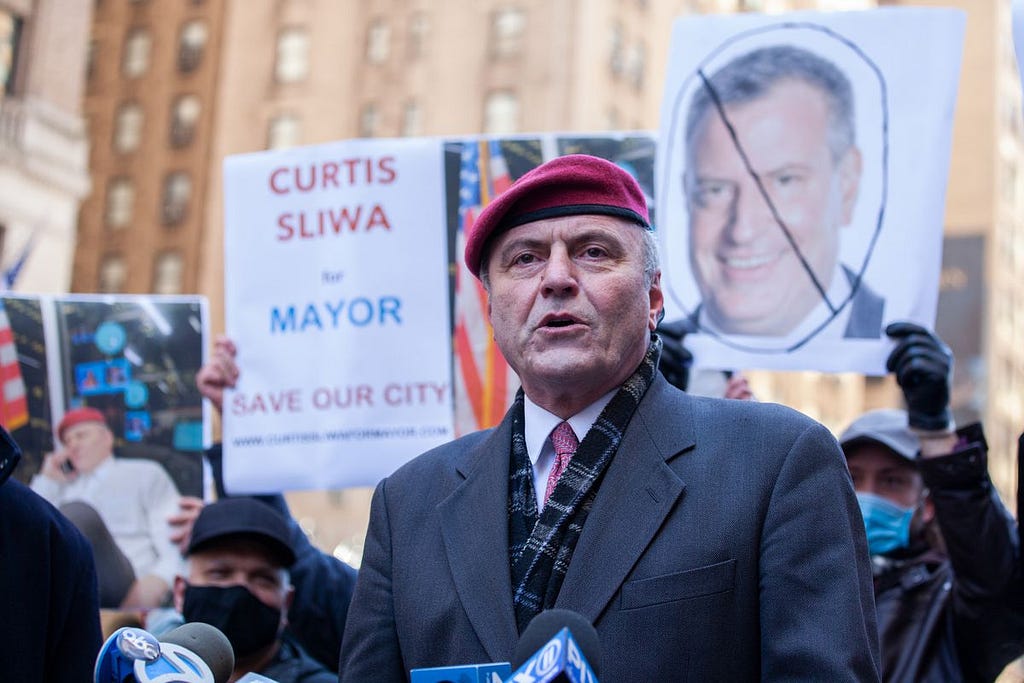
Okay, fantastic. That is a really great story. Can you share the funniest or most interesting story that happened to you in the course of your long career?
Well, the funniest didn’t involve me directly. It involved my father, Chester. This is in the later years of his life. He was having all kinds of cardiovascular issues. He was in the house that he owned with my mother, Francesca in Canarsie, and he had to go to the hospital. My mother called me up at WABC. It was right before my afternoon shift, and she said, “your father is not cooperating, Curtis. I’m going to call the ambulance.” I said, “mom, don’t call the ambulance because they’re going to take him to Brookdale Hospital, and that’s not a good place to be. I’ve been there many times. It used to be a great hospital, but now it’s not so good. So just keep dad there, pacify him, calm him down.”
I called over to Maimonides (Medical Center). I knew a few people over there, and said, “could you do me a favor? My father is not being cooperative. I don’t want him taken to Brookdale. Could you see if Hatzolah could pick him up and bring him to Maimonides?” He had been to Maimonides before. The dispatcher said, “Yeah Curtis, no problem.”
So they show up at Canarsie. My mother is looking out the window from the second floor, and she says, “Ches, Ches, get ready. The guys from the Hatzolah ambulance service are here.” And hears “Hatzola” and he goes “Hezbollah? Hezbollah? No, they’re not going to take me. There’s no way. I will fight!”
And now my mom gets me on the phone. The boys are downstairs, and they have the gurney. They heard him screaming, and I had to get on the phone: “Dad, dad, it’s not the Iranians. It’s not Hezbollah. It’s Hatzolah! I know these guys. They’ll take you back to Maimonides where you have your own doctors. They have your medical records.” And he says: “Make sure it’s not Hezbollah. I’ll fight them to the death!” Finally, I cajoled him and convinced him that it was okay to go in the ambulance with Hatzolah and they took him to Maimonides, and luckily they cared for him.
(Laughing) That’s a funny story. So let’s talk a bit about New York. As you know, there’ve been calls and implementations to defund the police in New York. Speaking as a part of the Jewish community who are often very vulnerable and victims of violence, the police are the bulwark that keeps us safe. Defunding the police makes the Jewish community feel very vulnerable. At the same time, the city has to balance the arguments that the police are unfairly or unjustly targeting minorities. What would you say? What would you do specifically to balance both sides, to increase police resources to lower crime, to bolster the police but at the same time address the concerns about unfairness and injustice?
The first thing I would ask is: How’s that defunding the police working out, that experiment? And yet there are still people who want to defund them even more like AOC (Alexandria Ocasio Cortez), who I call “All-Out Crazy”. She wants to take $3 billion out of a $6 billion police budget. That is meshuga. That’s crazy and all it has done is force the police to become reactive, not proactive. You call 9–1–1, it’s not the same response as we were used to getting.
In any field, there are always people who violate the rules. In the case of police who violate civil rights… Look, I got arrested 76 times in the first 13 years of the Guardian Angels, and oftentimes, I was given a wooden shampoo and a concrete facial by the police who thought I was a gang member — that I was a vigilante. That didn’t stop until Giuliani stopped it.
I know how somebody could have their rights violated. What I would do is tell the police: Do your job as you were trained to do, as you took an oath of office to do, but if you cross the line, I will be your worst enemy.
I know what it’s like to have your rights abused by police, but you have to support the police. You have to build up the morale that’s been crushed, and you have to show that there are parts of the city that support the police because they don’t see that. All they see are the people who give them the finger, who spray graffiti on the walls “F the police! All cops are bastards”. Then they see elected officials who scorn the police, and yet they have to provide armed security for these same officials who want to defund the police. This means you and I don’t have the benefit of being protected by armed police officers because of this defunding the police movement, and yet they’re getting armed security 24 hours a day.
So the hypocrisy, and not acknowledging this is a failure — a failed political maneuver on their part, which has caused a horrific rise in violent crime, gang crime, gun crime, and it’s mostly impacted the very community they said was being abused by the police, the black and brown community.
Do you mean to tell me that the abuse of the police against people of color was more extreme than the actual deaths by gunfire? Is the murder by gangs battling in the streets for control more preferable than the few cops who violated people’s rights? You can never get a straight answer. They hate the police. They don’t want police, and in many instances when anarchy prevails, they don’t have a remedy. It’s not like they have an alternative.
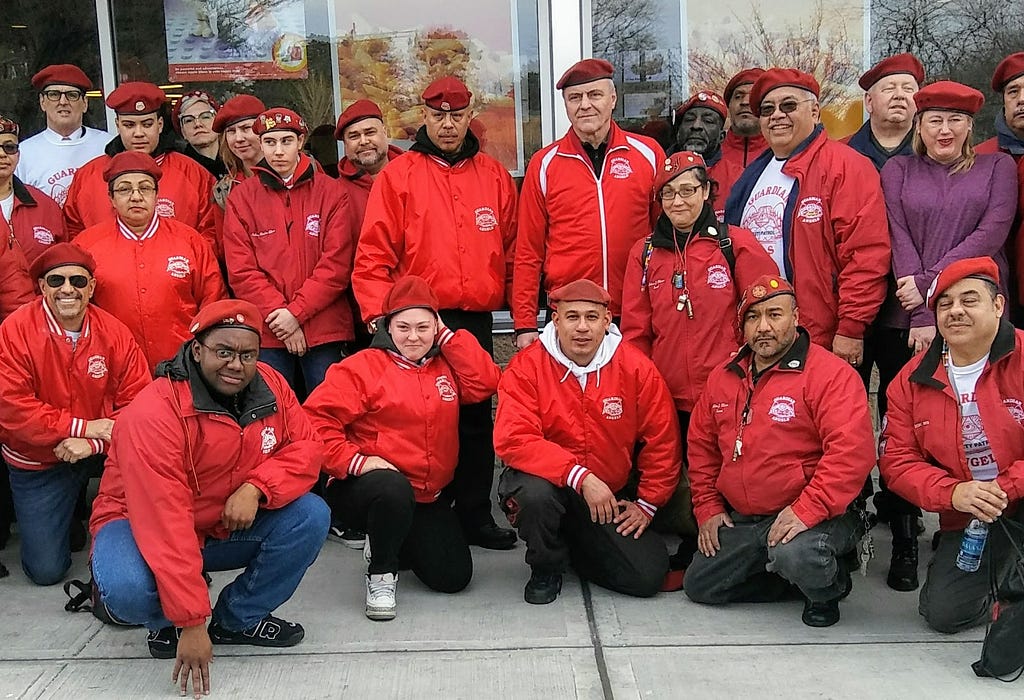
Excellent. Okay, wonderful. So I want to talk a bit about the video that’s been circulating. As you know, you have tremendous admirers in the Jewish community, particularly in the Orthodox community. You have a longstanding relationship with the Jewish community. Thousands and thousands have listened to you on the radio and they grew up with you, myself included. They saw you as a natural ally, somebody who has kindred values, a kindred spirit. And then the video was circulated. It felt like a different person was talking. It felt out of context. It felt like it came out of the blue. I saw the video and to be honest I didn’t feel like it was the same person that I remembered.
So could you talk to the Jewish community directly? Maybe if I could read you some of the quotes, could you explain and give context about what you meant?
I would say first off, those comments were made in the heat of a political battle, political anger. At the time I was the Chairman of the New York State Reform Party and it dealt with the areas of Rockland County and Orange County. I was in opposition to two things: The bloc vote because our party and other parties were being boxed in by the bloc vote of the Orthodox; and second, the argument about shuls and yeshivas having to conform to the New York State rules, the Department of Education rules, which state certain secular subjects had to be taught, especially math and science.
Most yeshivas and shuls I’d been to adhere to those rules. There’ve been a few that have been resistant, and at that time it was a state Senator Simcha Felder who stood in opposition and filibustered it on the state Senate floor. That led to a heated dialogue back and forth. Clearly, there are a lot of things I regret saying that I would never say again.
I dealt with it in 2018. I did my round of apologies and visits, but I noticed it was conveniently dropped on my head again, right after Eric Adams won the Democratic primary, especially when Andrew Yang dropped out because they were the two who were competing most heavily for the Orthodox and Hasidic vote. I said: “Well, this is part of politics.”
I’ll answer your questions, but I say to all the Orthodox and the Hasidim: Excuse me, but nobody ever asked (Adams) why he supported Louis Farrakhan for five years- five years! Nobody ever asked him. It’s almost like he’s been given an absolution. He should be asked that because I don’t believe he is a follower of Louis Farrakhan today. But just like Keith Ellison, who ran for Congress in Minnesota had to answer that question (about past associations with the Nation of Islam and Louis Farrakhan), and when he ran for State Attorney General in Minnesota, he had to answer that question. If the Gentile media won’t ask Adams that question, which they haven’t, it’s incumbent that the Jewish media do, or the Jewish leadership does.
When the video was re-released, I said to myself, “well, they’ve obviously made their choice, and they realize I have the support in the Orthodox and Hasidic communities, and they know that this would cost me that support.” But then some said, “Oh, Curtis is an anti-Semite.
That was really crossing the line. I have two younger sons who were raised Jewish- Carter and Hunter — who can go online and Google. In fact, about a month after the controversy, when I had my visit with them on a Sunday, my oldest son Carter said to me, “Daddy, why do you hate Jews? Why are you an anti-Semite?” And I said to myself: “For this, I needed to be called an anti-Semite?”
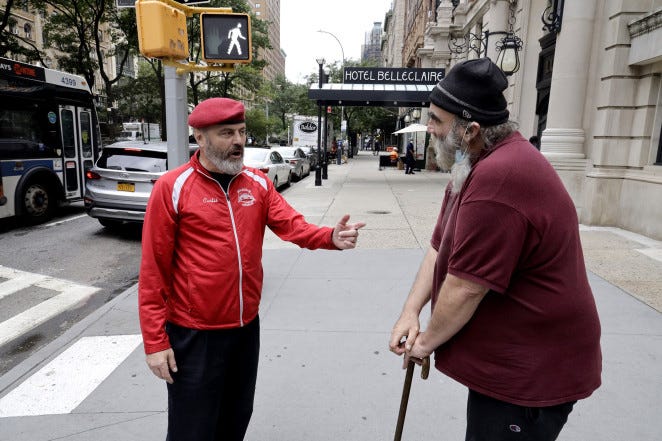
You could lecture me; you could criticize me. You can say I used harsh language, which I certainly did, and I never used it again. But, to label me an anti-Semite, they knew that’s like a scarlet letter. They knew the damage it could do, especially for Jews or Gentiles who really don’t know much about me, like hipsters and millennials who didn’t grow up with me.
Thank you. As far as I’m concerned I think you answered the question, but for the sake of the record, let’s go through the lines, and maybe you can give context.
So one quote was that “delivering the bloc vote in exchange for political favors, smacked of Tammany Hall corruption”. Do you recall that?
Yeah, I remember because again, the bloc vote was being used up in Rockland and Orange Counties to block us off, to block the third party. So it felt to me like Tammany Hall. Obviously, it wasn’t Tammany Hall, but in the middle of particular political arguments, you’re prone to use extreme comparisons. So no, the bloc vote is in no way, shape, or form Tammany Hall. I was wrong to use that comparison.
Ok, here’s another one: “We’re not talking about poor, impoverished, disabled people who need help. We’re talking about able-bodied men who study the Torah and Talmud all day, and we subsidize them. This is among the worst when it comes to siphoning off social services.” Can you perhaps give more explanation or context to that quote?
Yeah, I’ve been to Israel three times. Every time I’ve been there, you have the secular versus the religious who make similar arguments. Again, I know many who are observant, who work, who subsidize their own families and contribute their tithing for the good of the entire community. Then there are others who, at times, hide behind that.
Now, should I have labeled an entire community that way? No, but some of the things I was talking about are openly discussed in Israel by Jews versus Jews on a regular basis.
I think for some people to hear it from a Gentile, it stings. It’s wrong of me to put it in that context. But again, in a heated political argument, I brought up the situation that had nothing to do with the problem that was taking place. So again, I’m at fault.
Okay. So let’s ask another broader question on a different topic. Politics, in general, is very difficult. Clearly, running for Mayor in New York is extremely difficult. You have the international spotlight. It’s not an easy job. What is the main driving force that’s pushing you to run for Mayor?
My main motivation is that I see New York City going backward again. I was there in the 70s when the Guardian Angels and I helped save the city along with others, especially Rudy Guiliani. Remember, at that time when he got elected, we were averaging about 2,000 murders a year, 5,000 shootings, most of them were unsolved. Nobody thought the city could be managed. They thought maybe there would have to be five different cities, each borough would be a city to itself. People were leaving. Over a million people had left New York City, and they weren’t coming back.
Then Rudy had his position of zero tolerance law and order. He put the broken windows theory in full effect and quality of life first. He said, “the way you change it is from the bottom up.” Meaning you treat every violation as a serious violation, and then people will learn there are consequences for all of your negative actions, not just some of them, the more egregious ones, but even the less serious ones, and it worked. It was amazing. Nobody thought it would work, but it worked!
So instead of us reverting to the methods that helped bring peace and tranquility to a lot of neighborhoods that had never had that; it brought safer subways, safer parks…
But we’ve now gone in reverse, and it’s almost as if in this case, we want David Dinkins instead of Rudy Giuliani. I’m amazed because Eric Adams who declares he’s the “law and order candidate” says he would model his mayorship after David Dinkins. He said it many times, whereas I’ve said many times I would model my mayorship after Rudy Giuliani, and Rudy Giuliani has endorsed me. It’s like: How can you be all about law and order and want to be like David Dinkins who was anything but law and order?
I think with Eric Adams, he speaks out of both sides of his mouth. If you’re going to model yourself after David Dinkins, it’s not going to be a law and order city that you get, and we need it desperately because people are fleeing and businesses are not going to stay here. The jobs will go with the businesses and then how are we going to pay for all the social services that people need?
It’s basic common sense. It’s not even Democratic or Republican values. It’s common sense, and I listened to Eric Adams and it’s all: “He’s a former cop. He’s law and order.” Well, wait a second. He doesn’t want people arrested for “petty crimes” as he calls it — shoplifting, fare evasion, all of those quality of life issues. Well, if you don’t start arresting people for the small violations, then you’re basically saying to everyone “there are no consequences for your actions.” And this has been proven time and time again.
So now he says, “Oh, the Rudy Giuliani years, they were bad.” But, at the time he said that his hero David Dinkins was soft on crime and Rudy was doing the right thing. So this guy is like a constant flip-flopper, whereas I’ve been very consistent. And my goal is to save the city for everyone.
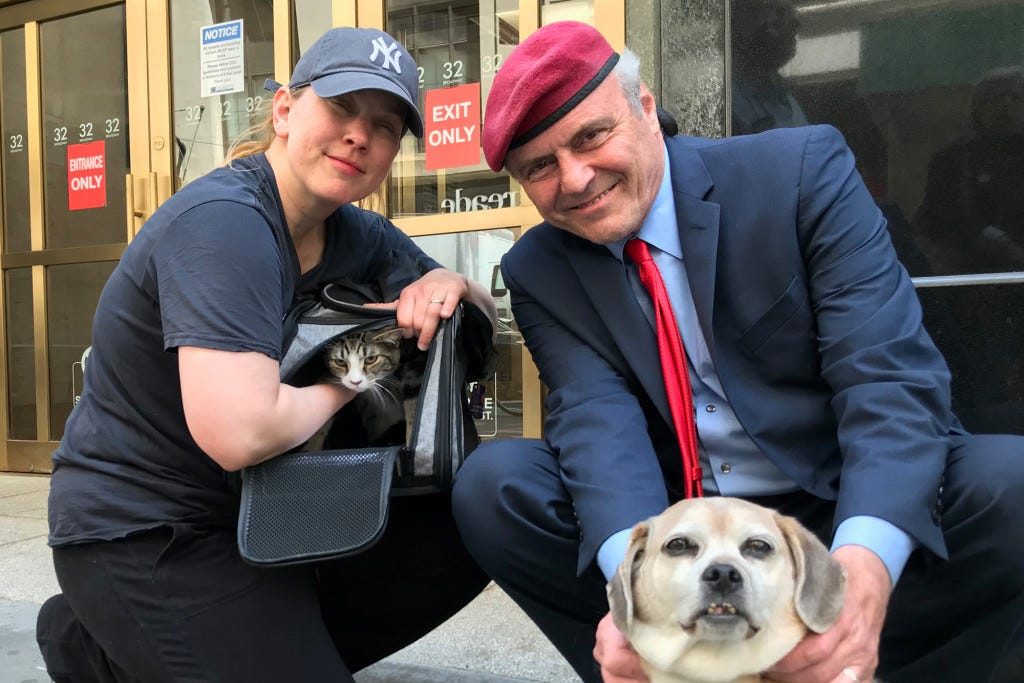
You have a lot of experience in harnessing volunteers — harnessing individuals to address a common good. The United States and New York City are facing a series of unprecedented world-historic crises. So many of us see it in the news and ask: What can we do to help? Could you share a few things that each of us can take to proactively help and heal and step up locally in our city and our country?
First, I think we depend too much on the government. Many citizens want the government to take care of them from the cradle to the grave. I don’t believe in that. That’s not my philosophy. I believe in self-help. The less you are dependent on the government, the better.
A perfect example is what we’ve seen from Shomrim and Shmira. They emerged because the government was not protecting Jews. It was allowing Jews to be victimized by criminals. So they looked at one another and said, “if we don’t protect ourselves, nobody will.” They were right.
Then you look at Hatzolah. They weren’t getting the ambulance services that other communities were getting, and they had to have a certain way of dealing with patients because of their religious beliefs. So they formed a volunteer ambulance service, which is the equivalent, if not better than some of the professional ambulance services, the for-profit ambulance services.
This is why the Guardian Angels came about: We weren’t going to wait for the City. We weren’t going to wait for the police. By us going out and volunteering our time, it forces the government to do its job when there is no alternative.
New York City is going through a rough period now. Are you optimistic that these issues can be reversed and New York will see better days ahead?
No, I’m a realist. I’m not a pessimist but pragmatically, we have to look at when this pandemic came about, the lockdown, all of a sudden more people used e-commerce and got used to it. So now there’s less need for small businesses or even mid-level-sized businesses. People put an order in and boom! They get the product delivered the same day. So many more people learned to work from home, and their employers realized: Wow! They are just as productive. And, in fact, they’re happier. They’re with their families more. They are not spending half their life on the subway or a bus or in a car. And, we don’t have to pay this huge overhead such as leasing square feet. You don’t need to be in New York City anymore. You could be in Waterloo, Iowa. It’s a global economy. So we have all this empty space, and everyone’s talking about yeah, the resurrection of New York City.
Well, number one, if you don’t make safe streets, safe subways, or safe parks, you’ll never resurrect the city. Who’s going to want to come? Who’s going to want to take the risk? Who’s going to want to stay? And second, if you keep driving people away who pay the taxes, who’s going to pay for all the social services needed and the education and the budget?
We’re not using common sense at all. I think we’re going to have to learn to do more with less. We’re going to be on the brink of fiscal collapse because we’re looking at a $6 billion looming debt that de Blasio is leaving us and that means everything. I’m going to have to say to every commissioner and to every department: “Show me how you can do more with less” because there’s no more money coming from Washington. It’s over. We got to take care of ourselves and right now we’re not capable of doing that under de Blasio. And to me, Eric Adams is a continuation at de Blasio. It’s like de Blasio 2.0.
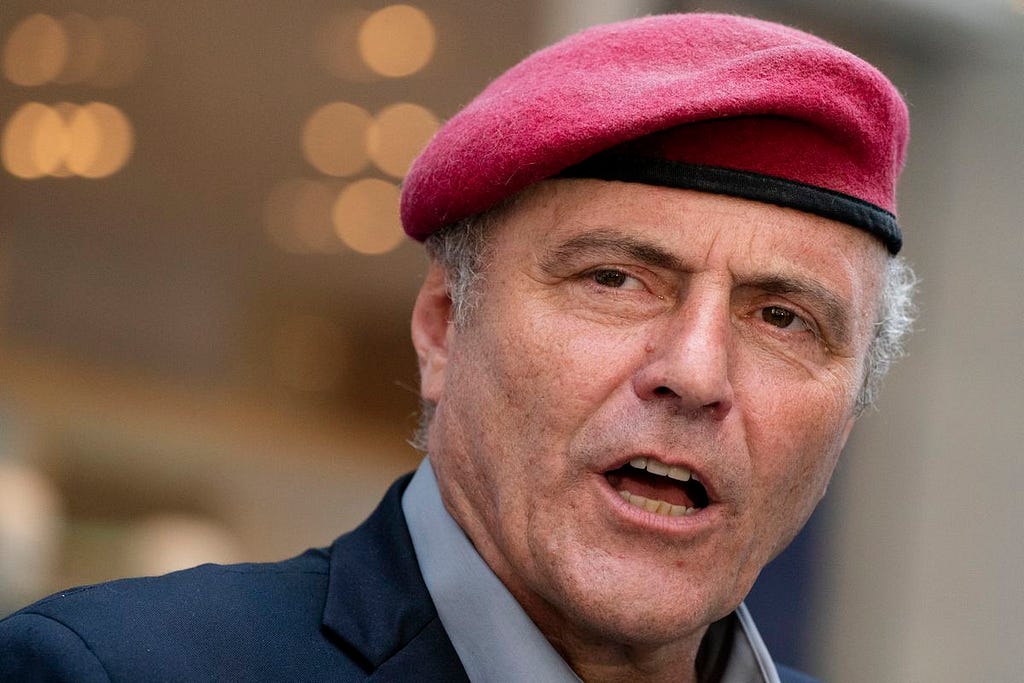
Excellent. Is there anything else you’d like to share with our readers? Any final thoughts?
I would say the leadership in the Orthodox and Hasidic community has made its choice. They’ve anointed Eric Adams as if he’s the Moshiach (Messiah), the political Moshiach, like he’s going to save the city. There is no human being who’s the Moshiach.
Make your own choice. You’ve seen Eric Adams. Where has he been when the community has been under attack? I haven’t seen him, and I’ve been there. Where has Curtis Sliwa been? Understand this: Eric Adams can say, “oh no, no, no. I’ll look after the concerns of the Hasidic community, the concerns of the Orthodox community,” but do you think he’s going to turn against this mentor, his ‘Medici’ Al Sharpton? Come on, if given the choice: Will he sit and break bread with Al Sharpton, who is no friend of the Jewish community, or with the rabbis of the Orthodox and Hasidic communities? If the choice has to be made, the Orthodox and the Hasidic lose.
Excellent. Curtis, thank you so much for your time. I’m really grateful for your gracious interview, and I wish you continued success.
Oh anytime, and just let your readers know I’m always open to being cross-examined. I don’t have political flacks around me. Curtis Sliwa talks for himself.
That’s great. I really appreciate you, Curtis, and have a fantastic day and a fantastic week.
Oh, my pleasure. Thank you.
Thank you. Take good care. Bye.
NYC Mayoral Candidate Curtis Sliwa On His Relationship With New York’s Jewish Community, The… was originally published in Authority Magazine on Medium, where people are continuing the conversation by highlighting and responding to this story.
